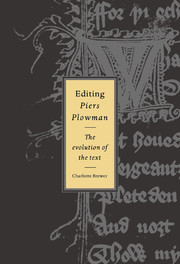Book contents
- Frontmatter
- Contents
- Acknowledgements
- Abbreviations
- Note on the texts
- Introduction
- Part I The early phase
- Part II The late nineteenth century
- 5 The Early English Text Society and its editorial context
- 6 Skeat: introduction
- 7 Skeat's A-Text
- 8 Skeat's B-Text
- 9 Skeat's C-Text
- Part III The Skeat aftermath
- Part IV Chambers and Grattan, Knott and Fowler
- Part V The Athlone Press edition
- Part VI Epilogue: the Athlone aftermath: Schmidt, Pearsall, Rigg-Brewer, et al.
- Works cited
- General index
- Index of manuscripts
- CAMBRIDGE STUDIES IN MEDIEVAL LITERATURE
6 - Skeat: introduction
Published online by Cambridge University Press: 20 August 2009
- Frontmatter
- Contents
- Acknowledgements
- Abbreviations
- Note on the texts
- Introduction
- Part I The early phase
- Part II The late nineteenth century
- 5 The Early English Text Society and its editorial context
- 6 Skeat: introduction
- 7 Skeat's A-Text
- 8 Skeat's B-Text
- 9 Skeat's C-Text
- Part III The Skeat aftermath
- Part IV Chambers and Grattan, Knott and Fowler
- Part V The Athlone Press edition
- Part VI Epilogue: the Athlone aftermath: Schmidt, Pearsall, Rigg-Brewer, et al.
- Works cited
- General index
- Index of manuscripts
- CAMBRIDGE STUDIES IN MEDIEVAL LITERATURE
Summary
Furnivall needed a large band of editors to fuel his project of bringing as many unpublished medieval English works to light as possible. Several of his victims were novices, none more so than W. W. Skeat (1835–1911), the man who was to become one of the most distinguished and industrious of editors produced by the late nineteenth century. Skeat was the first person to publish an edition of Piers Plowman which, by the standards of today, properly substantiates its claim to be full and scholarly. Like his predecessors, he was interested in the poem as a social document, but his slant on it was markedly different. From the beginning, he saw the issue of editing the poem as one of coming to terms as fully as possible with the manuscripts, and he seems to have believed that explicating the poem from a historical and literary point of view was necessarily subsequent to establishing the text. Today, of course, it is often accepted that the two processes are inextricably interlinked: editing is itself an interpretation of a text; nevertheless, Skeat's position is a substantial advance on that of his predecessors.
It is difficult to find out very much about Skeat, despite his extraordinarily prolific output of publications and editions, many of which contributed vitally to the state of knowledge of Middle and Old English texts. He expressed the strong wish that no biography should be written, and his family destroyed his papers after his death. The result is that little biographical material has ever been published on Skeat, other than the entry (by Kenneth Sisam) in the Dictionary of National Biography.
- Type
- Chapter
- Information
- Editing Piers PlowmanThe Evolution of the Text, pp. 91 - 112Publisher: Cambridge University PressPrint publication year: 1996

